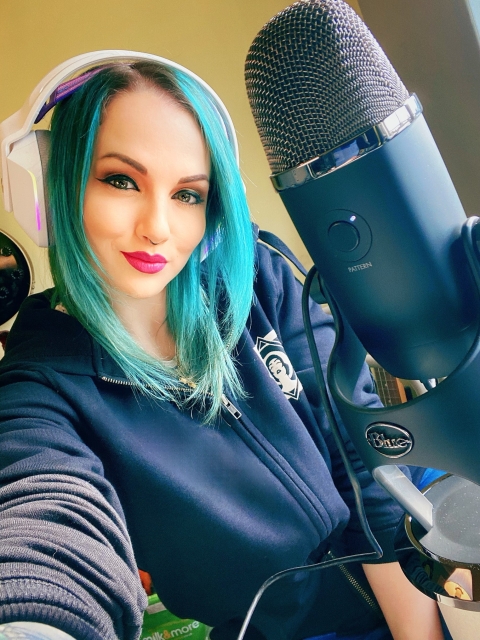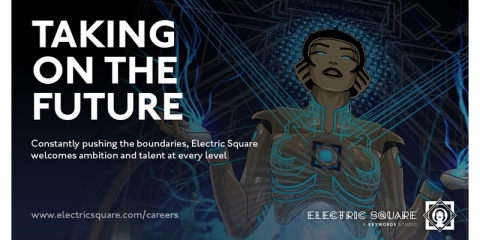

Sparkle, be different, don’t be afraid to connect and keep a positive attitude in your application journey. Fantastic session with charlotte pook from electric square studios.
5 min read
Creative Careers was delighted that Charlotte Pook, Acquisition Talent Manager for Electric Square studios could join us to provide us with a fantastic insight into her studio and how the application process can be broken down as well as the importance of making connections and interestingly how the games industry has changed due to the Covid pandemic.
In a nutshell, Electric Square is one of 57 sibling companies with their parent company being Keywords studio. Electric Square has its main studio in Brighton with other studios in Leamington Spa in the Midlands and Singapore. Their portfolio includes ‘Forza Street’ and ‘Hot Wheels id,’ with ‘Assassin’s Creed VR’ and electrifying AAA console games currently in development with more projects about to start!
Having watched the video about Brighton and their studio, it was very clear that Electric Square had a very inclusive culture and we were all struck by their great work/life balance which is crucial in this climate. With an outstanding Glassdoor rating of 4.8 out of 5 as well as perks including vast and varied social activities, a dog friendly studio, monthly home cooked lunches and a health and wellbeing allowance, this truly goes to show that they are keen to keep their employees happy and well looked after
Would you say there is a demand for any particular games industry roles?
Really refreshing to hear that it seems there are many different roles available at the moment. Programmers have always been in great demand. However, there seem to be tons of roles offering different positions - art, design, concept artists as just an example at all levels which allows for many opportunities.
What type of skills are important in the games industry?
Charlotte made it clear that soft skills such as good communication, honesty, and openness were crucial for her when she began viewing an application form, followed by the technical skills. She explained that in this industry you often work in close knit teams and being able to share knowledge and findings was really important. She noted that you should consider whether these roles are for you, if communication isn’t your strong point.
She went on to say that it was important to bring in diversity from all walks of life; different experiences, and seeing how applicants have grown from these challenges. She loved to hear about applicants' passions, interests and hobbies - noting that they were a nosy bunch at Electric Square wanting to find out more about the individuals applying - particularly if you were doing personal projects. She said it was really important to be open and show something of yourself so they can find out about you and not just your skillset.
Add some sparkle and personality to your application
Charlotte indicated that there were lots of different ways to stand out. She said that having a LinkedIn profile was crucial as it provided an easy platform for recruiters to read information in a clear and standard manner whether this be personal projects, skills or previous experience.
Add flavour to your character, particularly as it is not necessary to have the standard black and white A4 sheet for a CV as generally was the case. Applications for games industry roles are usually from creative students and putting some flavour into your CV, playing around with the fonts and design would make it eyecatching and stand out from the crowd. Recruiters love to see flair and creativity - using icons instead of words for hobbies or skills she added. Charlotte did stress that although creativity was great it shouldn’t impact on the end application being readable and the information being clear and concise.
In terms of your portfolio - less is more! Just ensure that you include only your best pieces so that what is produced is clean and, most importantly, finished. Why not show your portfolio to your peers and get their feedback and opinions on which pieces of work should stay and go?
What’s the worst that can happen?
Making contacts as a student will set you up for when you graduate and then you will have a strong circle of contacts you can use to gain opportunities.
Research companies you would like to work for and reach out by contacting the relevant lead in your chosen area. You will be surprised how keen they are to connect with you and give valuable feedback on your portfolio. Or you could reach out via social media whether it is LinkedIn or Facebook. Don’t be afraid to connect with industry professionals, the worst that can happen is that they don’t accept your request to link up.
What about if I don’t have any gaming industry experience or I am rubbish at playing games?
Funnily enough, it seems that as long as you have a passion for the subject even if you are not a great gamer, your skillset can sell you and help you get that job. Charlotte pointed out that producers don’t necessarily come from a gaming background, they can be from banking, tv and film and retail. Your interest in the gaming industry is significant but as long as you can show your talent in your particular area, that is more important.
Be aware of the level you are applying for because when you graduate from university you will be applying for an entry level position. If the position doesn’t actually say “entry”, stick to a standard design or designer title but don’t go for senior/lead as recruiters will know that you haven’t researched the company nor the position properly.
Does Electric Square offer an internship programme?
Charlotte stated that because of the type of projects Electric Square works on, they don’t always advertise internships so it was always best to send a speculative CV/Portfolio to her and she would match roles appropriately within the different teams.
Can you describe the recruitment process for an entry level position?
Charlotte was very good at explaining the different recruitment processes depending on the roles. She confirmed that due to the technical side of programming it would definitely have a technical test following a chat about what you have learnt on your course and what you have done to improve yourself. Everyone takes the same tests which give recruiters a baseline for them to work from and where you are at in terms of the industry standard and these tests help recruiters see how you applied your skills to certain challenges.
For design and art positions the portfolio would play a huge influence on the decision making. Soft skills are key if you are applying for a production role, your ability to communicate both formally as well as having informal chats with colleagues. Each application is looked at on a case by case basis and you may be asked to produce further information or examples if something extra is needed. So generally, there isn’t any stringent testing apart from programming which is quite standard for the technology department.
Charlotte agreed that sound design and narrative roles were far and few between. Although recently Electric Square did recruit a narrative designer for the Leamington Spa studio and perhaps further roles would open up in Brighton, however it really depends on the type of projects and mandates available. In Brighton they work with a great outsourcing company, The Rev Rooms, who were formed from Electric Square and Gobo ex-employees so they know and understand Electric Square’s mandates and therefore working with them is much easier.
So, it would probably be useful to look into outsourcing companies and see what they offer and who they work for.

Electric Square
Is VR where Electric Square sees itself moving permanently towards?
Not at all, it happens to be a project we couldn’t turn down when it was offered to us. We definitely are not actively pursuing VR mandates but it is one of several projects we are working on, in fact we currently have 6 projects and only one is VR. We never say never and perhaps another VR project might come our way.
Covid changes
As always we got on the subject of Covid and how this has affected the games industry and it was surprising to hear that Covid and the lockdowns didn’t really change anything for the games industry and as Charlotte said the games industry was “lucky” to be able to keep afloat during those strange times.
It certainly changed studios' outlooks on working remotely as there was proof that it had no implication on the output for the worker. And hybrid working allowed for a more diverse workforce giving more opportunities to those with families and those living far away from the studio. It has been a great move not just for Electric Square but for the whole industry to be able to offer a hybrid working - Charlotte said that at her studio they offer diverse opportunities either hybrid home/studio, living abroad she went on to say that they actually have one programmer who lives and works in Tenerife! Employees are able to decide what fits their lifestyle better, whether it is coming in for just the socials, or only working at the office, it is great to have these choices. The new working conditions have certainly opened up new opportunities for studios.
Software requirements
Every game industry role is different in terms of software requirements. For example, for an artist it would depend on what engines the client is using but two that stand out are Unreal and Unity, definitely start dabbling with these two as well as having a good understanding of Photoshop. For animation there are a wide range of software that are used such as Maya, 3DStudioMax, Substance and many more to look into. An incredibly good suggestion would be to take a look on LinkedIn and stalk the profiles of artists as this will soon give you a clear indication of what software they use and what you should be clued up on.
Charlotte responded that if you want to be a character artist it is still a good idea to have something else under your belt such as animation or VX effects. She mentioned that having a diverse skill set will set you above the rest. Particularly if the studio works on different projects and you can move between projects depending on your particular skill you offer. However, she did say that it was important to become great in one thing before you move into different areas.
It was such an open account of issues that computer games industry students encounter during their applications to studios. And she did say that at times the application process could seem disheartening but it was important to keep going, keep track of what you have applied for using a spreadsheet and generally have a system as well as the all important linking with loads of industry professionals and most definitely go in with a positive attitude! Great advice from Charlotte Pook who ended by saying get in touch!
Enable University alerts
Turn on notifications for critical updates like closures, safety alerts, and urgent service disruptions.





